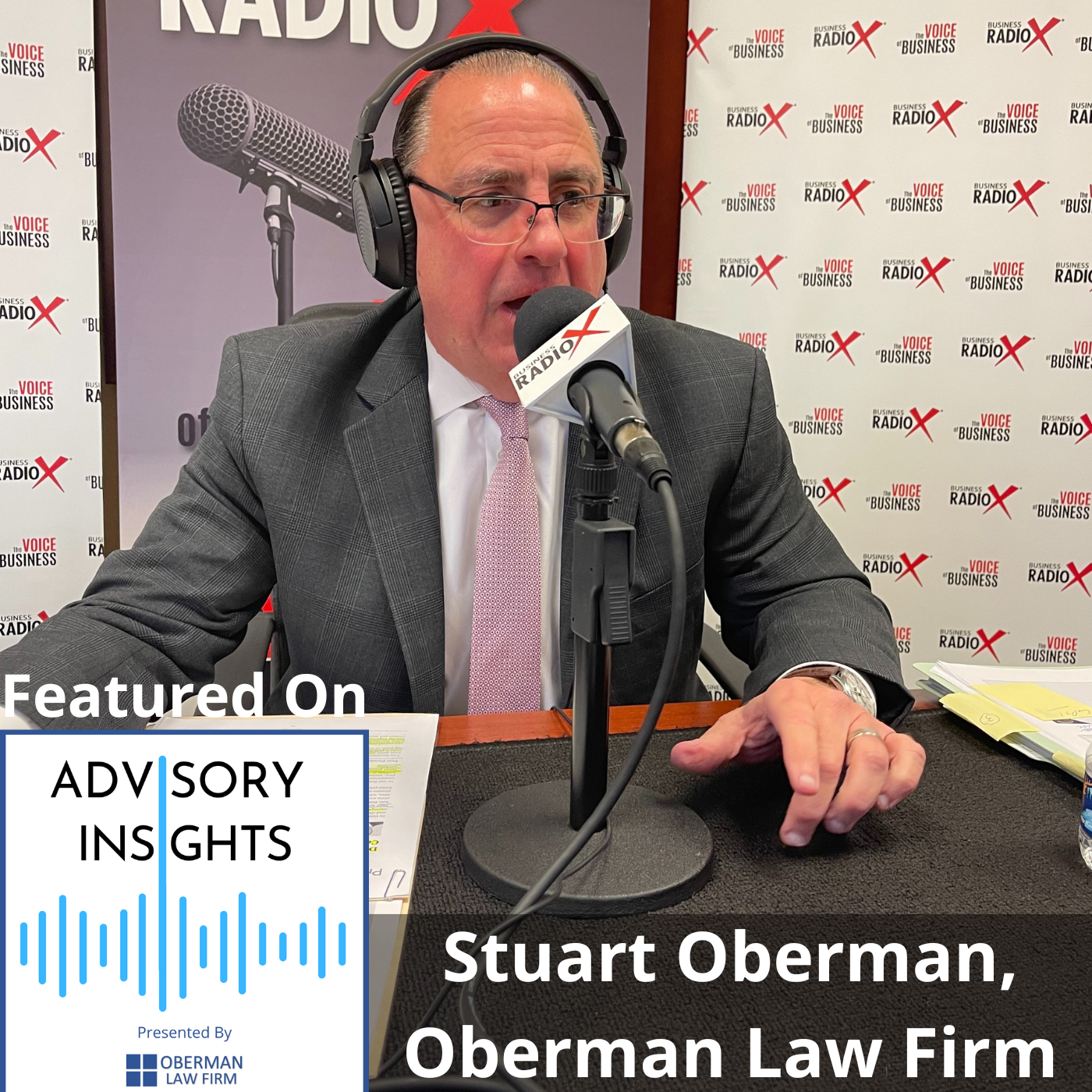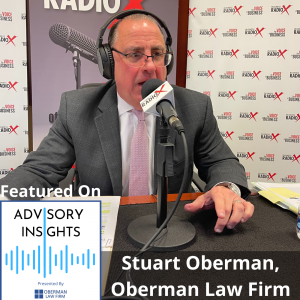
Best Practices for Employee Offer Letters (Advisory Insights Podcast, Episode 20)
On this episode of Advisory Insights, Stuart Oberman of Oberman Law Firm discusses why offer letters for employees are so vital and best practices for offer letters. He emphasizes that offer letters can make or break a company, and advises employers to document salary, benefits, performance reviews, and special conditions in their offer letters.
Advisory Insights is presented by Oberman Law Firm and produced by the North Fulton studio of Business RadioX®. The series can be found on all the major podcast apps. You can find the complete show archive here.
TRANSCRIPT
Intro: [00:00:01] Broadcasting from the studios of Business RadioX, it’s time for Advisory Insights. Brought to you by Oberman Law Firm, serving clients nationwide with tailored service and exceptional results. Now, here’s your host.
Stuart Oberman: [00:00:20] Welcome everyone to Advisory Insights, Stuart Oberman. Folks, we’re going to drill it down today. So, in the Great Resignation, in the Great Boomerang, in the great process of I’m going to hang around for the job for a while and see what it does, I’m gonna lay low, assuming that you had an interview that was squeaky clean – as we mentioned on some other podcasts – assume that you did everything correct, you loved your candidate, now you’re going to offer them the job. This is where it gets sort of tricky.
Stuart Oberman: [00:00:53] We’re going to take you through the topic for today, Best practices for employee offer letters. You’re probably thinking, “Well, I really don’t even offer my employees an offer letter.” That’s a big mistake. Every employee that you hire should have some type of offer letter. I don’t care what the industry you’re in, your employees need an offer letter.
Stuart Oberman: [00:01:19] Now, we’ve seen some disastrous offer letters. We’ve seen some good ones. I would walk through some basics. I mean, our offer letters that we offer our employees at the firm, obviously, are very long. Some may be very short. But I want to walk through some basics.
Stuart Oberman: [00:01:36] So, first and foremost, the key is that employee offer letters should never, ever, ever be considered an employee contract. If you have any doubt whether or not your offer letter is an employee contract, I would urge you to call your local council, whoever your general counsel is for the business. Ask them, “Does this have employment contract language in it? Am I going to get burned?” I want all language that creates an employment contract out. I want all that language out. At no time should your offer letters ever, ever, ever have language in there regarding employment contract.
Stuart Oberman: [00:02:23] Now, I want to walk through some basics. You know, for every job, there are so many variables for an employment contract. I get that, but I want an offer letter. What’s the guidelines? What are you doing upfront? What are the obligations of you? What are the obligations of your employee without even entering into an employment contract? There’s millions and millions of people that have jobs that don’t have contracts, but they should have offer letters which outlines certain things.
Stuart Oberman: [00:02:53] I want to know what your start date is, that should be in an offer letter. When you start, do you start two weeks? Is it tentative? Is it depending on whether or not your candidate has to get fired, laid off from the other job, or quit?
Stuart Oberman: [00:03:10] Contingencies – first and foremost, you’ve got to be careful with this one – are you requiring that employee to pass a drug test? Now, why do I say that? Because states are starting to limit drug tests.
Stuart Oberman: [00:03:24] Now, in our previous podcast, we talked about employees and employers that are dealing with the marijuana issue. That’s a huge topic right now. Are employers working around the marijuana issue? Some of them want to test for it, some of them want to go into panels. Drug tests, but you got to be careful. So, people in this podcast are listening not only in different countries but different parts of the region in the States, what does your local state say, what does the federal law say about drug tests?
Stuart Oberman: [00:03:57] Next, background test screening. We’re seeing a lot of pushback on this issue. You’ve got to make sure you understand what your Local and State Law is for this. Job title, “Well, I don’t really have a job title. We just come to work.” That’s not going to work in today’s world. They need a job title. What’s their title? And then, does it correspond with the employee manual? So, I have a job title, but I have no job description. So, really, the title is worthless because you’ve got no description as to what that guideline is. How are you tracking your employees and what their protocols are? Job titles, job descriptions in that employee manual.
Stuart Oberman: [00:04:39] I would tell you, the podcasts we’re doing and articles that we write as a firm, we can’t stress enough employee manuals. And it’s going to vary from industry, but if you don’t have an employee manual, folks, you’ve got to get one. Because, otherwise, you’re going to lose a lot of governmental arguments that relate to employment law and those kind of things.
Stuart Oberman: [00:05:00] So, salary, how are you paid? Are you exempt, non-exempt? Here’s a new one, are your salary non-exempt? Are you hourly non-exempt? How are you categorized? You need to know that. Is what you’re categorizing legal? What are your benefits? Health insurance, paid vacation. What does your employee manual say? PTO, leave. Folks, you’ve got to put your benefits down, 401(k)s matching, simple IRAs matching. What’s the protocols? What do you need to put in there?
Stuart Oberman: [00:05:40] Now, what we see a lot of times missing is performance reviews. How often are you going to do performance reviews once a year, once a quarter, every six months? Now, when a candidate starts, do you have a 90 day review period? Hopefully, the answer to that is, “Yes, I do.” If not, get one.
Stuart Oberman: [00:06:05] Now, the biggest question, employment at will. Every person you hire should be at will. Depending on the state, it will depend on how they define at will. But every, every, every offer letter needs to say at will.
Stuart Oberman: [00:06:21] Next, special conditions, two very hot topics on the local, state, and national level, non-competes. Folks, we’re seeing a lot and a lot of pushback on these areas. We’re starting to see some trends regarding how much you make as an employee. Do you even apply to that non-compete? If you make over 100,000 or 120, you know, what profession are you in? Do you have restrictions on your non-competes? You’ve got to look at that, folks, especially if you are a cross-border company where you may have 20 employees that work in 20 different states.
Stuart Oberman: [00:07:00] You know, sometimes I’ll ask the question to our employers, what states are your employees in and what states do you need guidance on? And their answer is, it’s easier to tell you what states we’re not in than the states that we are in. So, again, what are we looking at? Non-solicitation, I don’t care what your title is or what your job description is if you’re an employee, folks, your employees need non-solicitation. If they leave, they’re taking their stuff, they’re taking their list, they’re taking their confidential information, they’re taking your letterhead, they’re taking everything they’re using because they’re going to the next level, they’re going to the next company, and they’re going to utilize whatever they learned from you or Skyped from you or lifted from you, whatever you want to call the term.
Stuart Oberman: [00:07:50] Folks, I tell you, that’s a quick podcast but it is so very important that, one, you interview your candidate in the proper way, and we’ve discussed that on previous podcasts. Two, that you know exactly what you can do as far as drug tests and background tests. Do you even allow those? Once you get past that step, I want you to do offer letters. Again, if you don’t have an offer letter that you need council to review, get one. I cannot stress that enough. You’ve got to have guidelines for your employees. Salary, benefits, performance reviews, special conditions, folks, they’re all critical. Sometimes they will make or break a company depending on who’s coming and who’s going.
Stuart Oberman: [00:08:39] Folks, that is all for today’s podcast. Offer letters, you got to have them, folks. You got to have them. Stuart Oberman, Advisory Insights. Thank you so much for joining us today. If you have any questions, please feel free to give us a call, Oberman Law Firm, 770-886-2400 or email me, stuart – that’s S-T-U-A-R-T – @obermanlaw.com. Folks, thanks so much. Thanks for listening. Have a fantastic day.
Outro: [00:09:10] Thank you for joining us on Advisory Insights. This show is brought to you by Oberman Law Firm, a business-centric law firm representing local, regional, and national clients in a wide range of practice areas, including health care, mergers and acquisitions, corporate transactions, and regulatory compliance.
About Advisory Insights Podcast
Presented by Oberman Law Firm, Advisory Insights Podcast covers legal, business, HR, and other topics of vital concern to healthcare practices and other business owners. This show series can be found here as well as on all the major podcast apps.
Stuart Oberman, Oberman Law Firm

Stuart Oberman is the founder and President of Oberman Law Firm. Mr. Oberman graduated from Urbana University and received his law degree from John Marshall Law School. Mr. Oberman has been practicing law for over 25 years, and before going into private practice, Mr. Oberman was in-house counsel for a Fortune 500 Company. Mr. Oberman is widely regarded as the go-to attorney in the area of Dental Law, which includes DSO formation, corporate business structures, mergers and acquisitions, regulatory compliance, advertising regulations, HIPAA, Compliance, and employment law regulations that affect dental practices.
In addition, Mr. Oberman’s expertise in the healthcare industry includes advising clients in the complex regulatory landscape as it relates to telehealth and telemedicine, including compliance of corporate structures, third-party reimbursement, contract negotiations, technology, health care fraud, and abuse law (Anti-Kickback Statute and the State Law), professional liability risk management, federal and state regulations.
As the long-term care industry evolves, Mr. Oberman has the knowledge and experience to guide clients in the long-term care sector with respect to corporate and regulatory matters, assisted living facilities, continuing care retirement communities (CCRCs). In addition, Mr. Oberman’s practice also focuses on health care facility acquisitions and other changes of ownership, as well as related licensure and Medicare/Medicaid certification matters, CCRC registrations, long-term care/skilled nursing facility management, operating agreements, assisted living licensure matters, and health care joint ventures.
In addition to his expertise in the health care industry, Mr. Oberman has a nationwide practice that focuses on all facets of contractual disputes, including corporate governance, fiduciary duty, trade secrets, unfair competition, covenants not to compete, trademark and copyright infringement, fraud, and deceptive trade practices, and other business-related matters. Mr. Oberman also represents clients throughout the United States in a wide range of practice areas, including mergers & acquisitions, partnership agreements, commercial real estate, entity formation, employment law, commercial leasing, intellectual property, and HIPAA/OSHA compliance.
Mr. Oberman is a national lecturer and has published articles in the U.S. and Canada.
Oberman Law Firm
Oberman Law Firm has a long history of civic service, noted national, regional, and local clients, and stands among the Southeast’s eminent and fast-growing full-service law firms. Oberman Law Firm’s areas of practice include Business Planning, Commercial & Technology Transactions, Corporate, Employment & Labor, Estate Planning, Health Care, Intellectual Property, Litigation, Privacy & Data Security, and Real Estate.
By meeting their client’s goals and becoming a trusted partner and advocate for our clients, their attorneys are recognized as legal go-getters who provide value-added service. Their attorneys understand that in a rapidly changing legal market, clients have new expectations, constantly evolving choices, and operate in an environment of heightened reputational and commercial risk.
Oberman Law Firm’s strength is its ability to solve complex legal problems by collaborating across borders and practice areas.
Connect with Oberman Law Firm:
Company website | LinkedIn | Twitter
















